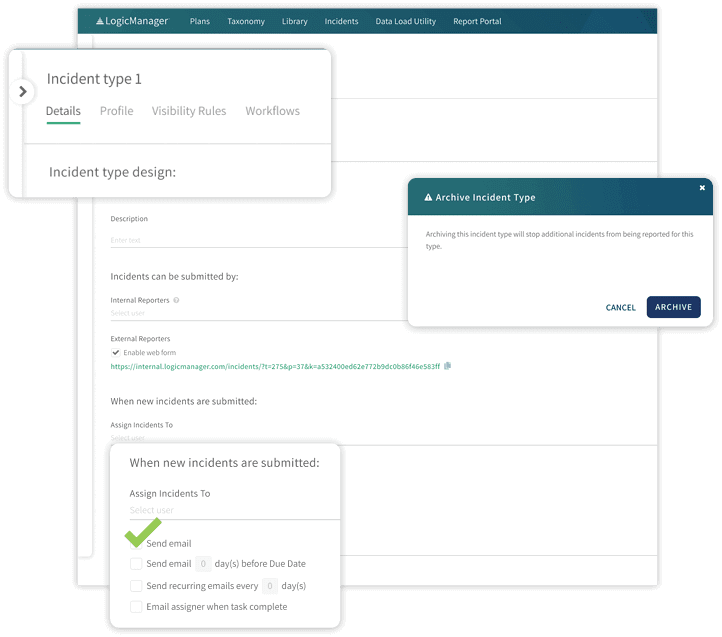Business Continuity Event Management
Efficient Business Continuity Software for Event Tracking, Notification, and Resolution
LogicManager offers a robust Business Continuity Event Management solution for handling business continuity events and cybersecurity incidents. Seamlessly connect incidents to people, policies, and controls, while streamlining root cause analysis and prevention. Customize data collection, break down silos with integrated references, automate workflows based on logic, and ensure preparedness with customizable home screens. Gain insights through powerful reporting and dashboards. Choose LogicManager for proactive and effective crisis management.
For additional value:
Why a Risk-Based Approach to Event Response is important:
LogicManager’s Business Continuity Event Management Solution
- LogicManager’s Event Management functionality allows you to better manage any business continuity event or cybersecurity incident by connecting it to the associated people, policies, procedures or controls to uncover root cause and prevent repeat occurrences.
- Use Custom Profile & Visibility Rules to dynamically collect additional information on an event or incident based on certain details (which servers were impacted?) or type (was it a natural disaster?) to provide better direction in the face of a crisis.
- Our integrated References & Risk Ripple features allow you to break down organizational silos by connecting your processes to the vendors they rely on, the applications they leverage and more so that your response plans account for upstream and downstream impact.
- LogicManager’s workflow capability can route events/incidents based on business logic (e.g. how many locations an outage or data breach impacted, which departments were affected most, etc.) and automatically assign tasks for the appropriate parties to carry out their response plan.
- Customize LogicManager home screens so that your end users can quickly and easily navigate to the right resources and associated tasks in an emergency state and ensure that key personnel are aware of what to do, increasing the chances of a smooth recovery.
- Experience a robust Reporting & Dashboards system that makes it easy to build reports on information including but not limited to business units based on criticality, RTO, RPO and key personnel.
Formalize your Event Response Process with LogicManager
Create relationships and increase visibility
Link any event that occurs to the departments it’s affecting. This then allows you to easily see all of the events that have affected any particular department, helping you gain additional visibility into those critical business functions.
Gain an ERM partner
Since LogicManager is an ERM platform, you’ll be able to see interdependencies across all areas of your organization as you work. If a particular vendor or application is identified as the root cause of an event, see just how far that impact spread across the enterprise.
Automate your processes
Our workflow engine allows you to automate a response action plan to ensure the correct teams are made aware of the event and take the appropriate action. Designate responsibility, set reminders and due dates and understand exactly what occurred and what was impacted. This also provides an audit trail of your efforts.

What is Event/Incident Response?
Event Response is a key process within any business continuity or incident management program. Similarly, Incident Response is a key process that refers more specifically to reaction to IT-related risk events, such as a data breach. Both processes involve the planning and execution involved in an organization’s reaction to any event that impacts their operations, service or functions. Having an annual schedule of updating your event and incident response plans can help your business stay on track with a clear timeframe and ensure you’re staying on top of the ever-changing risks posed to your organization.
A strong event/incident response plan should enable your organization to keep operations up and running (at least at a minimal level) in the midst of a crisis (e.g. a hurricane, data breach, pandemic, etc.). Being able to respond quickly to an interruption helps maintain business resiliency. Your plans should provide clear guidelines for if the time comes to respond to an incident/event; there should be no question for employees across all departments about how to move forward, which is why responses should be outlined on various levels.
Taking a risk-based approach from the start enables you to lay out what is most vital to keep running and determine what could stand to be paused until a later date. In order to optimize time and resources, it’s critical for stakeholders contributing to response plans to provide honest, transparent recovery time objectives and recovery point objectives.
Risks
Here are just a few ways risks can materialize when you forego having a mature Event Response plan in place:
- Maintaining a comprehensive BCP is very resource-intensive without the right software; employees’ valuable time and energy are spent manually carrying out administrative tasks instead of focusing on achieving long-term, strategic goals.
- If you’re not prepared following disaster, you may not be able to fix interruptions in your critical lines of business. This can lead to severe financial impacts.
- A lack of preparedness and subsequent revenue loss can decrease stakeholder and consumer trust. Lower market valuations and customer retention rates lead to – once again – negative financial impacts.
- Should there be any form of legal charges brought against you, you’ll have no defense if you’re unable to prove that there was anything you could do to prevent the event from happening in the first place.
- Immediately following an event, it’s critical to track remediation efforts to provide a paper trail for future auditors and regulators (and most importantly, to ensure you do not make the same mistake twice).
Request a DemoLearn How LogicManager’s Business Continuity Event Management Software Can Transform Your BCP Program
Speak with one of our risk specialists today and discover how you can empower your organization to uphold their reputation, anticipate what’s ahead, and improve business performance through strong governance.

